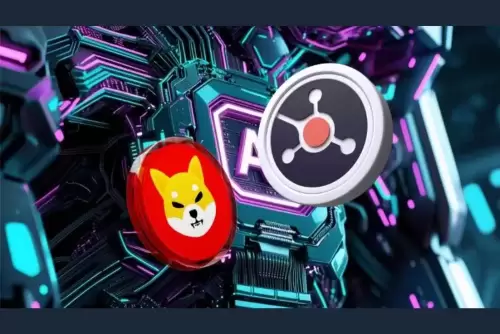 |
|
 |
|
 |
|
 |
|
 |
|
 |
|
 |
|
 |
|
 |
|
 |
|
 |
|
 |
|
 |
|
 |
|
 |
|
Cryptocurrency News Articles
Bitcoin Hyper (HYPER) Could Quickly Become One of the Standout Names
May 22, 2025 at 08:53 pm
Scaling Bitcoin has become a hot topic. Many people are talking about how to fix Bitcoin’s biggest weakness and solve those slow and expensive transactions.
Bitcoin Hyper is aiming to fix one of BTC’s biggest problems. Many projects are trying to solve slow and expensive transactions on the Bitcoin network.
Bitcoin Hyper (HYPER) could quickly become one of the standout names in this field. It’s not just about speed. HYPER is offering fast transfers, staking, DeFi features, and even smart contract support. These features are aimed at unlocking more real-world use cases for Bitcoin.
How Bitcoin Hyper Works
Imagine an environment where Bitcoin can finally be used like modern crypto. That’s what Bitcoin Hyper is setting out to create with its smart and high-speed Layer 2.
When you send BTC to the canonical bridge, the system verifies the transaction and mirrors your Bitcoin on the Hyper Layer 2 chain. From there, you can use that wrapped BTC for staking, trading, games, or NFTs. It all runs on Solana’s virtual machine, which means transactions are super fast and cheap.
To keep it secure, Bitcoin Hyper bundles transactions and sends proof back to the Bitcoin network using zero-knowledge technology. The goal is for everything to feel instant and smooth on the Hyper chain.
Bitcoin Hyper vs the Rest: A Different Kind of Layer 2
Bitcoin Hyper is going head-to-head with familiar Bitcoin Layer 2 players like Stacks, Lightning Network, Botanix, and the experimental BitVM. But it stands apart with a different technical base.
As mentioned, it’s built on top of Bitcoin but leverages the Solana Virtual Machine (SVM) to deliver near-instant BTC transfers, wrapped asset support, and a full DeFi environment.
Stacks uses a proof-of-transfer model and deals with slower confirmation times. Lightning Network, excellent for instant payments, lacks programmability and staking. Botanix offers a smart contract approach but is still early in adoption. BitVM is highly experimental and more of a research project.
Bitcoin Hyper brings speed, versatility, and a live staking model that users can interact with immediately. It offers smart contract support on par with Ethereum Layer 2s, while still being tied to Bitcoin’s unmatched security.
Performance, Security, and Staking Power
Bitcoin Hyper combines speed and decentralization. It uses proof-of-stake to validate its Layer 2 operations, which keeps energy use low, while its zero-knowledge proofs periodically commit the Layer 2 state to Bitcoin’s Layer 1. This means high efficiency without compromising Bitcoin’s base-layer security.
The $HYPER token powers network fees, unlocks staking yields, grants voting rights for protocol decisions, and provides early access to new features. At the presale phase, staking APY is currently set at around 5,000%, although the protocol adjusts these rates downwards as more users join to preserve long-term economic stability.
This kind of early-stage reward system is part of what is helping Bitcoin Hyper gain traction in a crowded field. Lightning and BitVM don’t offer any form of staking, and Stacks uses its own model for incentivization, but Bitcoin Hyper is trying to bridge utility, scalability, and user participation in one move.
A Growing Ecosystem with a Roadmap to Match
Bitcoin Hyper isn’t just promising speed. Its roadmap signals a full-fledged ecosystem, including DeFi apps, NFT platforms, a developer SDK, and DAO governance. All of this is supported by a canonical bridge system that ensures BTC can move between Bitcoin and its Layer 2 without relying on custodians.
As the Layer 2 race accelerates in 2025, the question becomes which platform will grab the biggest share of developer attention and user liquidity. If Bitcoin Hyper can deliver on its architecture by combining the efficiency of Solana’s execution engine with the robustness of Bitcoin’s security model, it could be Bitcoin’s answer to the entire alt-L2 movement we’ve seen on Ethereum.
Bitcoin Hyper’s claim is bold: the fastest Bitcoin Layer 2 in history. Whether it wins the war will depend on how well it executes this vision, but one thing is already clear. This isn’t just another bridge or payment channel. It’s a bet on Bitcoin’s future going far beyond just digital gold.
How to Buy Bitcoin Hyper (HYPER)
To buy $HYPER, you can use either crypto or a card. First, fund your wallet with crypto from any exchange like Binance or Coinbase. If you don’t yet have a wallet, tools like Best Wallet or MetaMask are easy to set up.
Once your wallet is ready, visit the official Bitcoin Hyper website and click the Buy or Connect Wallet button. You can choose the Buy and Stake option to purchase and start earning rewards in a single step. If you prefer to pay with a card, simply connect your wallet and choose the Card Payment option.
Staking rewards begin immediately during the presale, giving early participants access to some of the highest APYs in the space. The sooner you join, the better your potential yield.
VISIT THE
Disclaimer:info@kdj.com
The information provided is not trading advice. kdj.com does not assume any responsibility for any investments made based on the information provided in this article. Cryptocurrencies are highly volatile and it is highly recommended that you invest with caution after thorough research!
If you believe that the content used on this website infringes your copyright, please contact us immediately (info@kdj.com) and we will delete it promptly.


























































